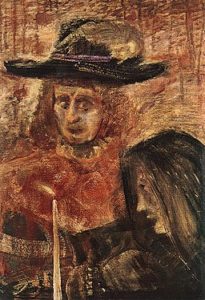Learning the Language of Denshin by Daniel Ausema

The language of Denshin can only be learned
in the hours after dusk.
An aspirant must indicate her wish to learn
by leaving a black scarf on the line
for three days running, finally taking it down
when a stranger passes by and comments
on the flowers across the street
where there are no flowers.
Or, if that won’t be possible, he may choose
to prepare his food three days in a row
with the root of the sapling elm,
a local delicacy. Then when he neglects to purchase
the root the following day, he must make no comment
on the fact but refer instead to a forgotten poet.
Either way, a week later a waif will appear
at the aspirant’s window, and for two months
teach nothing but the vowels from sunset to midnight.
Only when each vowel is perfect,
does the second teacher arrive, not to teach
the consonants or tones, nor even the grammar.
Instead the elderly teacher will discuss the potentials,
the branches Denshin did not take, the ways its vocabulary
might have turned out, the lost dialects and linguistic distinctions
among smaller subsets of the people, most ignored
or actively suppressed. The standard language becomes
defined by the variants it is not.
In the midst of this instruction, the third teacher will arrive,
a shadowed figured who simply speaks the language.
When the elder talks of dialects, the shadowed one
translates every word into Denshin.
When the elder falls silent, the shadowed one speaks on,
letting the uncanny rhythm of the shadowed language
enter the mind of the aspirant, letting the words take root.
Never once is she quizzed on the declensions and agglutinations;
never is he tested on which tense and why, but slowly
in the shadowed one’s word, all those rules and rhythms
are clear, with no need to explicate.
When the aspirants finally speak their first words of Denshin,
they find themselves in a market, offering black scarves and
elm saplings, and praise of flowers and poets that no one sees.
By night, they take on the look of waifs. For a time, for a time.
illustration is Man with Hat and Woman with Black Scarf, Lajos Gulacsi
One Response to “Learning the Language of Denshin by Daniel Ausema”
Leave a Reply
You must be logged in to post a comment.

[…] Ausema poem, “Learning the Language of Denshi,” Polu Texni, Nov 13, […]